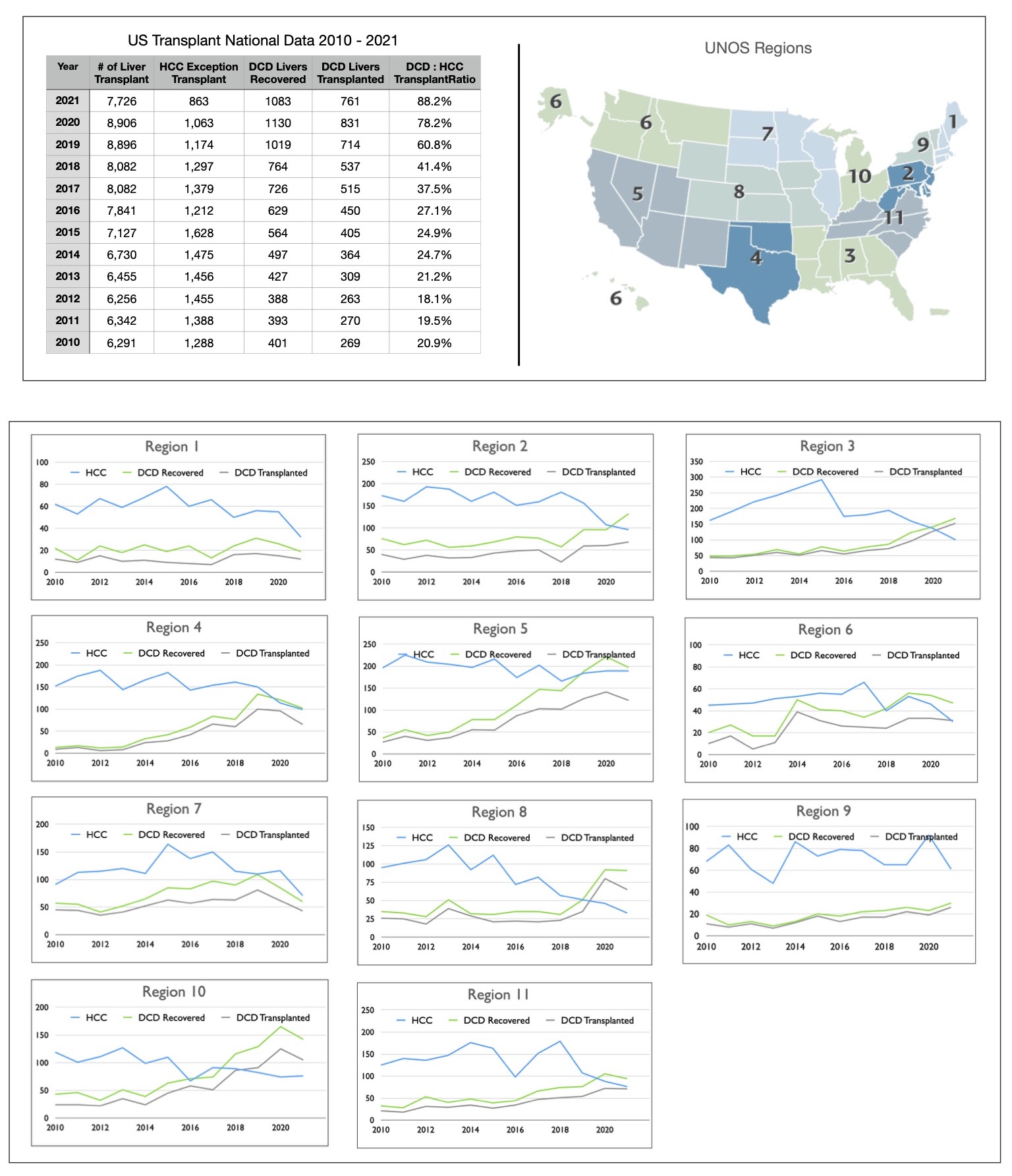The Feasibility of Changing HCC MELD Exception Criteria to an Exclusive DCD-Only Option: A Strategy to Increase DCD Utilization
G. J. McKenna, P. Schultz, M. Finotti, M. Rosenzweig, A. Gupta, S. H. Lee, A. Wall, E. Martinez, J. Bayer, H. Fernandez, N. Onaca, R. Ruiz, G. Testa
Baylor Simmons Transplant Institute, Baylor University Medical Center, Dallas, TX
Meeting: 2022 American Transplant Congress
Abstract number: 232
Keywords: Donors, marginal, Donors, non-heart-beating, Hepatocellular carcinoma, Liver transplantation
Topic: Clinical Science » Liver » 59 - Liver: Expanding the Donor Pool* (Liver: MELD Allocation / Donor Issues)
Session Information
Session Name: Expanding the Donor Pool (MELD Allocation/Donor Issues)
Session Type: Rapid Fire Oral Abstract
Date: Monday, June 6, 2022
Session Time: 3:30pm-5:00pm
 Presentation Time: 4:40pm-4:50pm
Presentation Time: 4:40pm-4:50pm
Location: Hynes Room 312
*Purpose: Outcomes of DCD liver transplantation is comparable to DBD but routine utilization of DCD liver grafts is surprisingly uneven in the US. A more uniform and broader utilization of DCD liver grafts would significantly ease supply-demand pressure. The greatest benefit would be seen for HCC patients. We propose a new HCC Exception Criteria system where priority points would only be allocated for the use of DCD liver allografts. The implementation of such system would nudge transplant centers toward the utilization of DCD liver grafts. This study assesses whether the present supply of DCD liver grafts would match the new demand of the proposal
*Methods: All patients transplanted from 2010-2021 using HCC Exception priority points and for the same period all DCD livers recovered and transplanted were identified in the UNOS database. To detect trends of utilization, the data was stratified by year and UNOS region.
*Results: In 2020, 1063 HCC Exception patients were transplanted and overall 831 DCD liver grafts were transplanted. If these DCD liver had been allocated solely to HCC patients, 78.2% of demand would have been met. Figure 1 outlines the incidence of HCC exception transplants, DCD livers recovered, and DCD livers transplanted per year from 2010-2021. The graphs in Fig 1 represents the trends in number of HCC exception transplants, DCD liver graft recovered and DCD liver grafts transplanted in each UNOS Region.–Regions 3, 8, 10 have performed a number of DCD liver transplants that exceeds the number of HCC MELD Exception Criteria transplants –Regions 2, 4, 5, 6, 11 have not performed a number of DCD transplants to fulfill the HCC Exception Criteria transplant demand. Interestingly, the number of DCD liver grafts recovered in this region might have met demand had center selection criteria been expanded. –Regions 1, 7, 9 have not recovered enough DCD transplants to meet demand for HCC Exception Criteria transplants and would need to change practices similar to other regions to meet demand.
*Conclusions: Several UNOS regions have shown steady increase in DCD liver utilization and have reached the level where they could meet the demand to transplant all HCC patients using DCD allograft. If such utilization increase could be adopted simply following the proposed HCC exception priority point, in the regions presently underutilizing DCD liver grafts, the US would witness a significant positive impact on organ supply. .
To cite this abstract in AMA style:
McKenna GJ, Schultz P, Finotti M, Rosenzweig M, Gupta A, Lee SH, Wall A, Martinez E, Bayer J, Fernandez H, Onaca N, Ruiz R, Testa G. The Feasibility of Changing HCC MELD Exception Criteria to an Exclusive DCD-Only Option: A Strategy to Increase DCD Utilization [abstract]. Am J Transplant. 2022; 22 (suppl 3). https://atcmeetingabstracts.com/abstract/the-feasibility-of-changing-hcc-meld-exception-criteria-to-an-exclusive-dcd-only-option-a-strategy-to-increase-dcd-utilization/. Accessed February 16, 2026.« Back to 2022 American Transplant Congress

